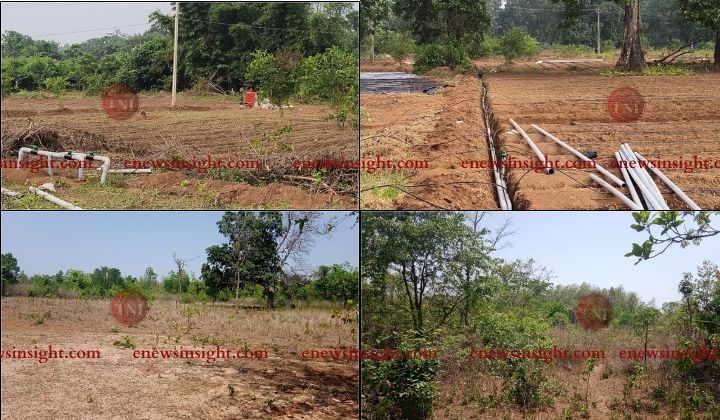By Janaki Ballav Dash
Keonjhar: The impact of rampant mining on the lives of natives in Keonjhar remains a cause of grave concern despite numerous efforts to address the issues. More than a decade after the Supreme Court-directed Shah Commission inquiry into mining irregularities, the situation for local communities shows little improvement.
In 2019, an Oversight Committee was established to monitor the development initiatives under the Odisha Mineral Bearing Areas Development (OMBADIS). The committee has since conducted multiple field visits, including the most recent one from December 21 to 23, 2024. However, the ground reality reveals persistent challenges to livelihood, health, education, and access to safe drinking water despite substantial funding channeled from the District Mineral Foundation (DMF) and OMBADIS.
Several large-scale drinking water projects initiated under DMF remain incomplete, forcing locals to depend on muddy and unsafe water sources. Streams and ponds have turned orange and muddy due to excessive mining activities, rendering them unfit for consumption. “We still have to use this contaminated water,” said Bata Dehury, a tribal elder, highlighting the dire situation.
Health issues in mining-affected areas are rampant. Diseases such as tuberculosis, malaria, jaundice, respiratory disorders, and typhoid are prevalent, exacerbated by pollution from unregulated mining activities. In the Banspal block, areas like Talakainsari have become dumping grounds for mining waste, further endangering public health. Continuous transportation of minerals over damaged roads has worsened the situation, particularly for children and the elderly.
Dr. Suman Panigrahi, a local doctor, noted that while DMF funds have been utilized to improve medical infrastructure, including a new medical college under construction with ₹400 crore allocated, the health crisis persists due to a shortage of doctors and paramedics.
Mining activities have led to the diversion of over 10,451 hectares of forest land, according to official data. This loss has severely impacted the tribal population, which accounts for 48% of the district’s residents and depends heavily on forests for traditional practices, livelihoods, and rituals. The shrinking green cover has deprived them of critical resources, pushing them further into deprivation.
Support Independent Journalism? Keep us live.
Governance and Accountability Concerns
Despite mining contributing significantly to Odisha’s economy, the rights of the local people to clean air, water, and a sustainable livelihood have been systematically neglected. Cases of human rights violations have been brought before the National Human Rights Commission (NHRC), which has called for remedial measures. However, many of these measures have only been partially implemented or remain unaddressed.
The state government claims to have executed 32 mega drinking water projects, but only six have been completed, leaving the rest abandoned midway by private contractors. Manoranjan Tiriya, a representative of the Forest Minister, emphasized efforts to expedite these projects and improve living conditions.
Collusion and Legal Battles
Documents obtained by TNI reveal collusion between mining companies and government officials, enabling continued exploitation under the guise of legal disputes. Even when penalties have been imposed, violators have often circumvented accountability through prolonged court cases. The documents will be posted later in a separate post.
Community Voices Demand Change
The people of Keonjhar, including former Panchayati Raj member Braja Dehury, have expressed frustration over the slow pace of progress. “Despite the Chief Minister being a native of this region, many issues remain unresolved,” Dehury said. The community continues to hope for decisive action to address their plight.
Rampant illegal mining, coupled with lax governance, has wreaked havoc on the environment and public health in Keonjhar. As mining activities persist unabated, the voices of the affected communities grow louder, demanding urgent and meaningful intervention to restore their fundamental rights.This report is based on official documents and inputs from local sources. Some identities have been withheld for privacy reasons.


Comments are closed.